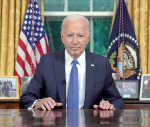You are here
Africa’s coup d’états and the new world order
Sep 12,2023 - Last updated at Sep 12,2023
In an increasingly interconnected world, where globalisation and geopolitical tensions collide, the recent coup d'état in some African nations has sent shockwaves throughout the international community. This event serves as a stark reminder of the ongoing power struggle between East and West, each vying for dominance in shaping the emerging new world order. A coup d'état, by its very nature, disrupts the established political order and replaces it with a new regime, often through undemocratic means. Recent events have shown that coups remain a potent tool for power-hungry factions seeking to wrest control from existing governments. However, the motivation behind these coups is not always internal; often, external actors play a significant role.
The most recent coups serve as a prime example. In such nations with a history of political turmoil and external interference, the coups appeared to be the result of a carefully orchestrated plan that involved both domestic and international actors. Those incidents are not isolated ones but rather part of a broader trend in which East and West use geopolitical strategies to expand their influence.
The rivalry between East and West is not a new phenomenon. It dates back to the Cold War when the United States and the Soviet Union competed for global supremacy. Today, this rivalry persists, albeit in a different form. While the Cold War ended with the collapse of the Soviet Union, it ushered in a period of unipolarity dominated by the West.
However, the balance of power has shifted in recent years. The rise of China and Russia as formidable global players has challenged Western dominance. These nations are actively pursuing strategies to expand their influence, not only in their immediate regions but also on a global scale. The recent coup bids are a manifestation of this broader East-West struggle.
They highlight how nations strategically position themselves on the geopolitical chessboard. In this complex game, each move is carefully calculated to gain an advantage over adversaries. While coups are often portrayed as internal conflicts, they frequently involve external actors who provide support, resources, and political cover.
The West, primarily represented by the United States and its allies, is not without its strategies. It seeks to maintain its dominance by propping up friendly governments, promoting democracy, and providing military and economic aid. However, these efforts often result in accusations of interference and attempts to impose Western values on sovereign nations.
The coup's aftermath is often marked by chaos, violence and uncertainty. The power vacuum created by the abrupt overthrow of a government invites various factions to vie for control. In this state of turmoil, extremist groups can flourish, exacerbating regional instability.
One only needs to look at recent examples to understand the far-reaching consequences of such disputes. Following Muammar Qadhafi’s fall, Libya descended into a fractured state, with rival factions vying for control. Syria's civil war, sparked by external involvement, has left a trail of devastation and instability. Afghanistan, after the withdrawal of Western forces, is grappling with the resurgence of the Taliban.
These conflicts have far-reaching implications, including mass displacement, humanitarian crises and the spread of extremist ideologies. The international community, particularly neighbouring countries, is left to grapple with the fallout from these disputes.
The coups in a number of nations not only disrupt regional stability but also reverberate throughout the world, adding another layer of complexity to the already intricate web of East-West relations. The competing narratives and interests of major global players create a fragmented global landscape, where cooperation becomes increasingly challenging.
As the East and West vie for dominance, the international system faces several critical challenges. The erosion of trust between major powers undermines efforts to address pressing global issues such as climate change, nuclear disarmament and the ongoing pandemic. Multilateral institutions designed to foster cooperation are increasingly paralysed by divisive geopolitics.
The global economy, too, bears the brunt of East-West conflict. Trade disputes, sanctions and tariffs disrupt supply chains and economic stability. As nations align themselves with one camp or the other, a new era of economic nationalism threatens the principles of globalisation and free trade.
Amid the rising tensions and conflicts between East and West, seeking avenues for dialogue and cooperation is imperative. The challenges facing the world today, from climate change to global health crises, require collective action and a united front.
The coups serve as a stark reminder that the international community must address the root causes of geopolitical conflicts and work toward conflict prevention. Diplomacy, dialogue and a commitment to international law and norms can pave the way for peaceful resolutions to disputes.
Furthermore, it is essential for global leaders to recognise that the world is no longer unipolar. The rise of new powers in the East presents an opportunity for multipolarity, where nations can cooperate and compete within a framework of shared interests and values. The West must adapt to this changing landscape by engaging with emerging powers on equal footing.
The recent coups are not merely an isolated event but part of a broader trend of East-West rivalry and competition. Geopolitical disputes are increasingly affecting global stability, from regional conflicts to economic disruptions. It is imperative that the international community, led by major powers, prioritise cooperation, dialogue and conflict prevention to navigate these challenging times.
As the world grapples with the consequences of East-West conflict, the path forward must emphasise common ground and shared interests. Only through collective action and a commitment to international norms can we hope to address the pressing global issues that affect us all. The new world order should be one built on cooperation, rather than competition and conflict, for the betterment of humanity as a whole.













